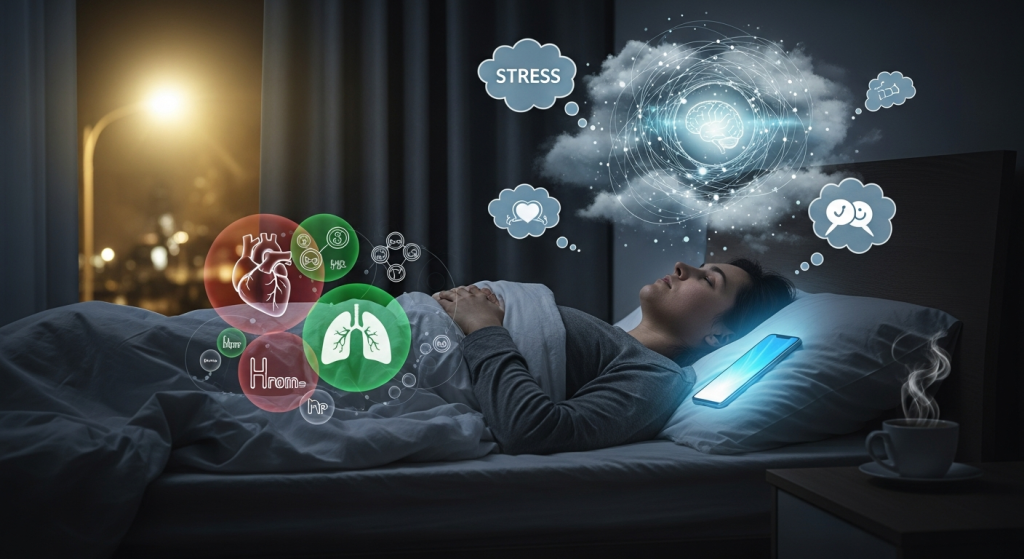Sleep is a complex biological process influenced by a wide range of physical, emotional, and environmental factors. When these elements become disrupted, the body’s natural sleep–wake balance; also known as the circadian rhythm; is thrown off, often leading to chronic sleep difficulties. Understanding the causes and risk factors for sleep disorders is the first and most critical step in identifying effective treatment options.
At WellGen Health, we believe that personalized care begins with identifying the “why” behind every patient’s sleep challenges. Whether your sleepless nights are caused by stress, lifestyle habits, or medical conditions, recognizing these triggers allows us to develop targeted solutions that restore restful, consistent, and rejuvenating sleep.

Your daily habits and behavioral choices have a direct impact on how well you sleep. The modern lifestyle; characterized by long work hours, digital overload, and inconsistent routines; has made sleep disruption increasingly common. Below are some of the most influential lifestyle-related causes of sleep disorders:
These behavioral factors are among the most manageable causes of sleep disorders. With personalized lifestyle coaching and expert guidance, WellGen Health helps patients make meaningful changes that restore natural, restful sleep patterns.
In many cases, sleep disorders are not just behavioral; they are symptoms or complications of underlying physical or medical conditions. Understanding these connections is essential for accurate diagnosis and effective treatment.
At WellGen Health, our sleep specialists evaluate these medical contributors using advanced diagnostic tools. By identifying the link between physical health and sleep, we help patients achieve holistic improvement; not just in their sleep, but in overall wellness.
Your surroundings and biological makeup also play a significant role in determining how well you sleep. Even small environmental changes can influence your ability to relax and sustain deep sleep.
At WellGen Health, we recognize that optimal sleep health requires more than medical care; it requires creating a lifestyle and environment that supports relaxation and recovery.
Sleep disorders often arise from the interaction of several risk factors rather than a single cause. For example, a person who experiences chronic stress, works irregular shifts, and has untreated sleep apnea faces multiple compounding risks. Over time, these factors reinforce one another, leading to more severe and persistent sleep problems.
Our specialists at WellGen Health take a multidimensional approach, examining all aspects of a patient’s life; medical, psychological, and environmental; to pinpoint the root causes of poor sleep. This allows for targeted interventions that not only relieve symptoms but also promote long-term sleep stability.
Understanding the underlying causes of a sleep disorder is essential for designing an effective treatment plan. Without addressing the root source; whether it’s lifestyle habits, medical conditions, or environmental triggers; temporary fixes like medications or over-the-counter aids will only offer short-term relief.
At WellGen Health, we use evidence-based diagnostic methods, including comprehensive sleep assessments, to identify the contributing factors unique to each patient. Once the cause is identified, we develop personalized strategies that may include behavioral therapies, medical treatments, and lifestyle guidance designed to restore balance to your natural sleep cycle.
No two individuals experience sleep disorders in exactly the same way. That’s why WellGen Health focuses on individualized sleep disorder management; addressing each patient’s specific risk factors and causes. Our holistic care model integrates advanced diagnostics, lifestyle education, and medical expertise to help you reclaim consistent, refreshing, and restorative sleep.
By understanding what triggers your sleep problems, you can make informed decisions that lead to meaningful change. Whether your sleep difficulties stem from stress, hormonal imbalance, or an underlying health issue, our goal is to help you achieve lasting improvement and renewed vitality.
At WellGen Health, we don’t just treat sleeplessness; we uncover its roots. Because when you understand what’s keeping you awake, you can finally begin to rest, recover, and restore your health.